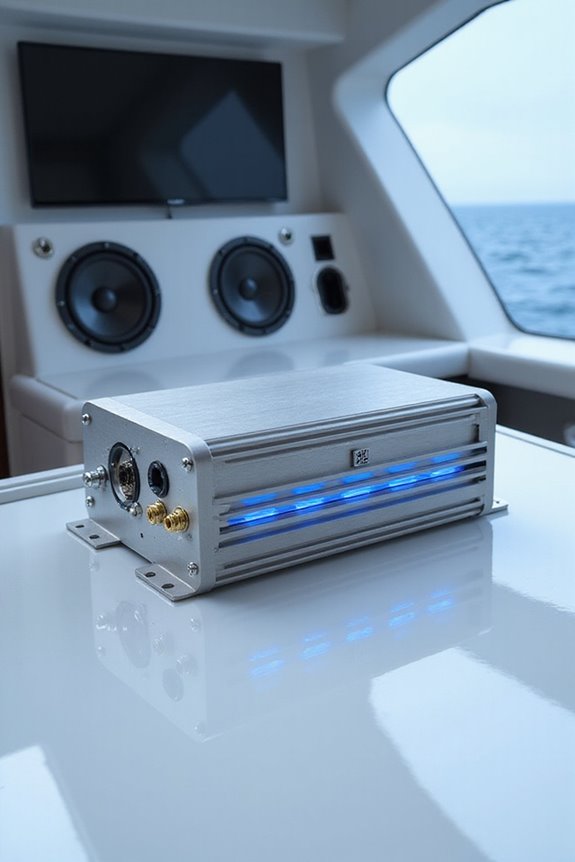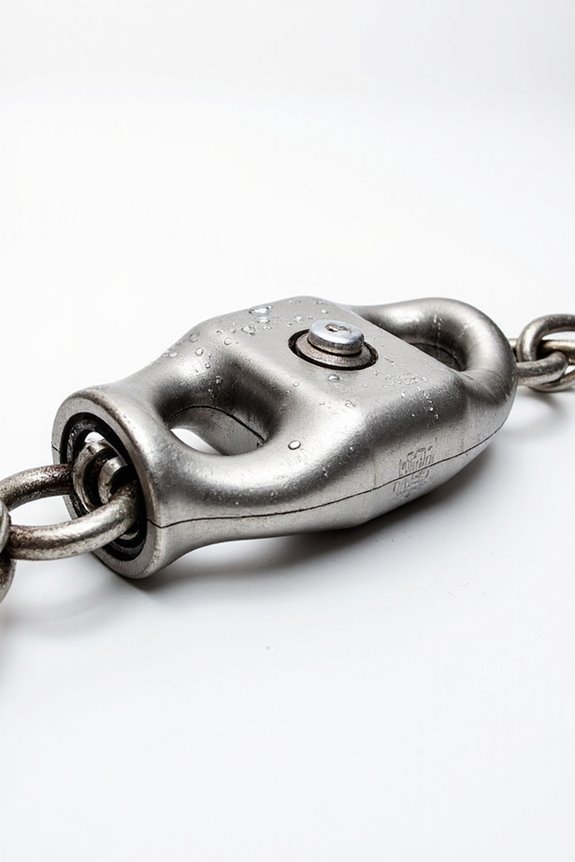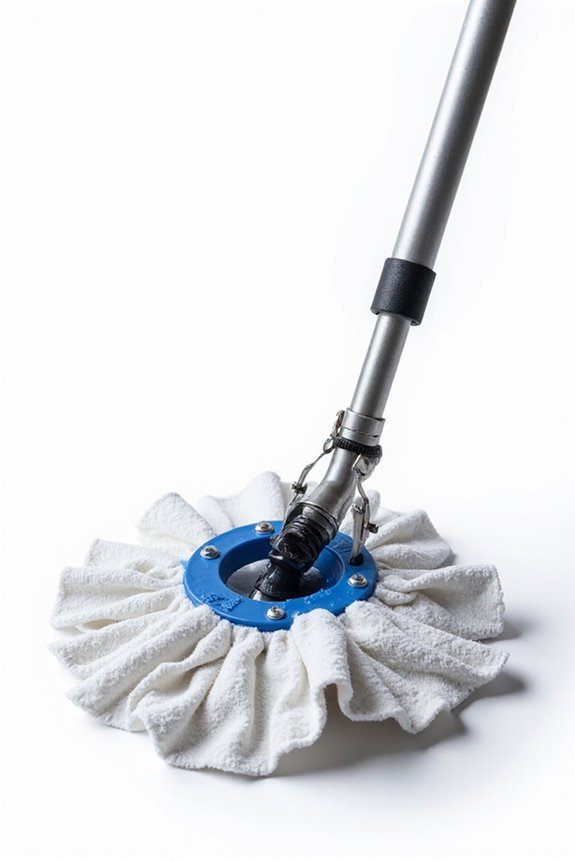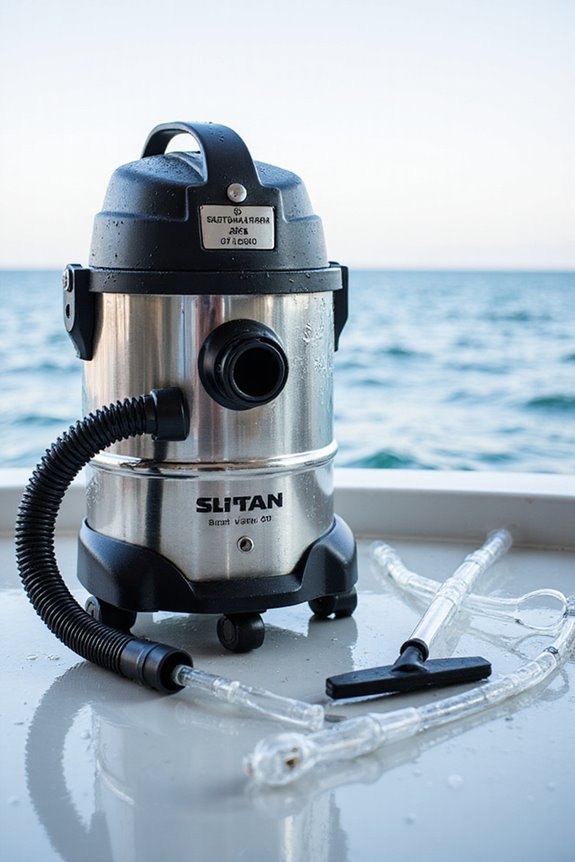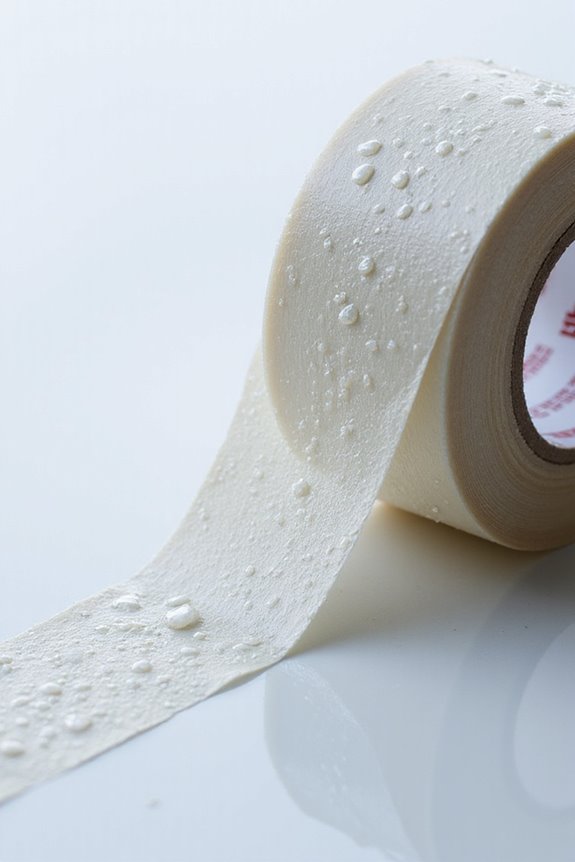When we talk about amplifier power output for your yacht, we’re really focusing on RMS power—the steady, reliable energy that keeps your sound clear without frying your gear. Peak power numbers? They’re flashy but mostly just show what the amp can do in short bursts, not all day. Matching impedance is another key—get that wrong, and your sound distorts or your amp overheats. Plus, controlling distortion and using marine-rated gear guarantees your system sounds great and lasts longer. Curious how to fine-tune all this?
Key Takeaways
- RMS power rating indicates continuous amplifier output, ensuring consistent and reliable sound quality on your yacht.
- Matching amplifier impedance to your yacht’s speakers, typically 4 ohms, prevents overheating and distortion.
- Power ratings are calculated using voltage squared divided by load resistance, reflecting amplifier efficiency.
- Choose amplifiers with low Total Harmonic Distortion (THD) for clearer sound without unwanted noise.
- Marine amplifiers feature corrosion-resistant components and adjustable settings to maintain durability and custom sound tuning.
How Amplifier Power Ratings Are Determined
Even though amplifier power ratings might seem straightforward at first, there’s actually quite a bit that goes into determining them accurately. When we talk about power calculations, it’s all about the voltage squared divided by resistance—yeah, math sneaks into our audio world! These calculations aren’t just random numbers; they’re carefully measured using RMS voltage to reflect consistent output, not just peak moments. Then, output standards come into play, setting industry benchmarks for how those numbers should be tested and reported. It’s like following a recipe so everyone’s amplifier “dish” tastes just right. Plus, power ratings change depending on the load impedance, meaning what your speakers need can shift the equation. So, when we look at those labels, we’re really seeing a little science and a lot of precision working together.
Importance of RMS vs. Peak Power in Marine Amplifiers
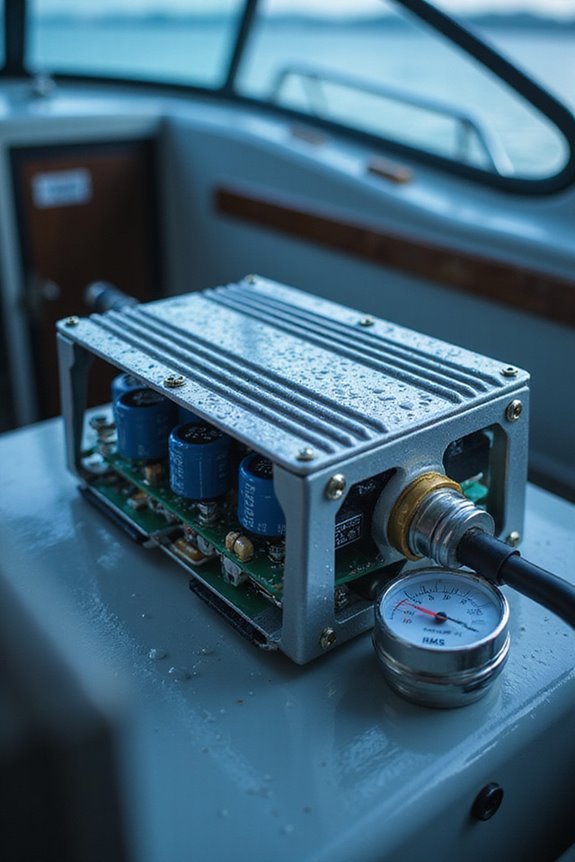
Power ratings on marine amplifiers can be a bit puzzling, especially when we see numbers like RMS and peak power thrown around. Let’s clear this up: RMS benefits lie in its ability to measure continuous output—the steady power your amplifier delivers without distortion, ensuring marine durability and sound clarity over long trips. Peak power, on the other hand, shows the amplifier’s short bursts of maximum output, but its limitations mean it’s not a reliable indicator of everyday performance. In a yacht’s compact, humid environment, we want power efficiency and consistent sound quality more than flashy peaks. So, focusing on RMS power helps us choose gear that stays cool, handles marine conditions, and keeps tunes clear without stressing the system. Isn’t it comforting to know what really matters?
Matching Amplifier Impedance to Yacht Speakers
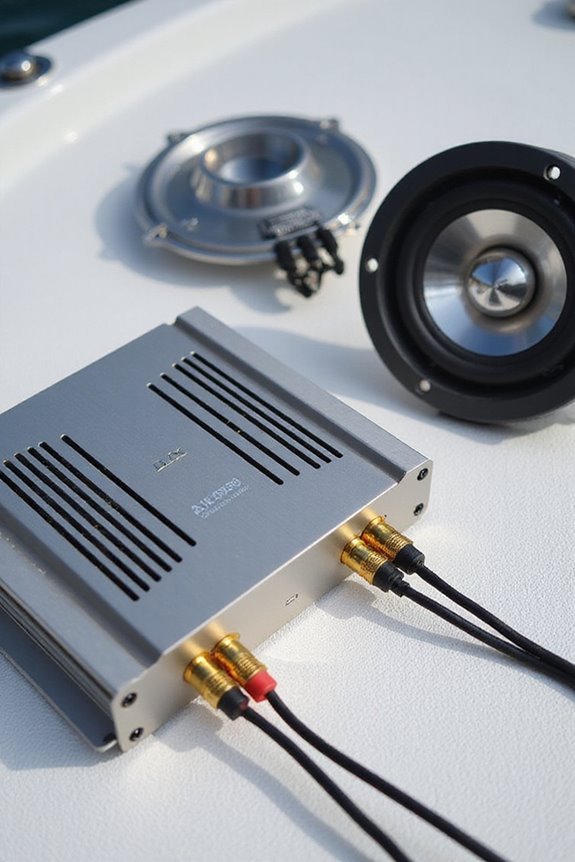
When it comes to setting up a stellar sound system on your yacht, matching amplifier impedance to your marine speakers is one of those details that often gets overlooked—but it shouldn’t. Impedance mismatch effects can sneak up on us, causing the amplifier to overheat or sound distort-y, which nobody wants while cruising. Most marine amps thrive on a 4-ohm load, so sticking to this rating—or something close—keeps everything safe and sounding clear. Remember, speaker wire considerations also matter; using the right gauge and secure connections can help maintain proper impedance and prevent power loss. It’s a bit like teamwork: the amp and speakers have to get along to deliver smooth, powerful audio. So, getting impedance right guarantees your sound system performs reliably, even when the seas get rough.
Enhancing Sound Quality With Power and Distortion Controls
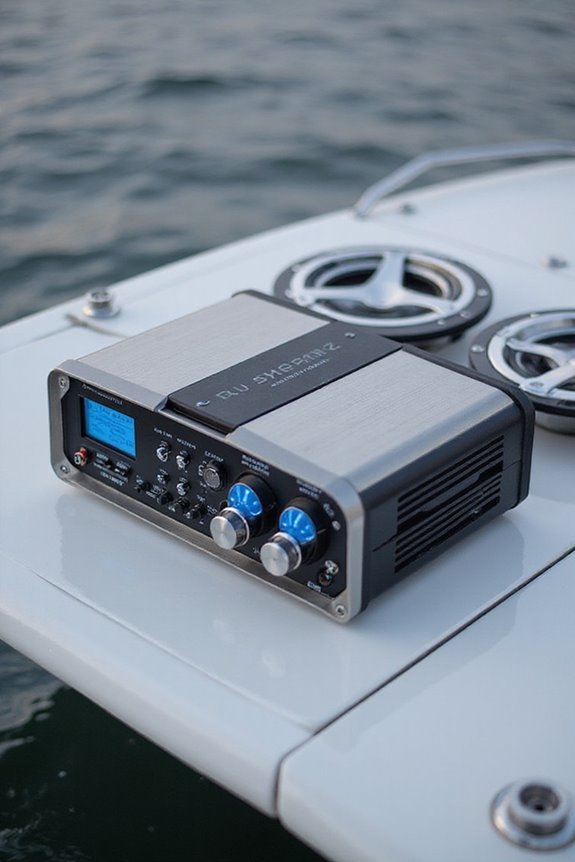
Although we might not always think about it, controlling power output and distortion plays a huge role in how great our yacht’s music sounds. When we talk about distortion management, we’re really looking at how to keep sound clarity sharp—even when cranking up the tunes. Using amplifiers with low Total Harmonic Distortion (THD) values, say below 1%, helps prevent that annoying fuzz or “clip” sound. Plus, features like electronic crossovers direct the right frequencies to tweeters or subwoofers, reducing muddiness and preserving crispness. Ever noticed how clean bass sounds on some systems? That’s often thanks to subsonic filters that cut unwanted low-frequency distortion. Together, mastering power and distortion controls keeps our music clear, balanced, and enjoyable—because on a yacht, the soundtrack should be as smooth as the sea breeze.
Features to Look for in Marine Amplifiers for Yachts
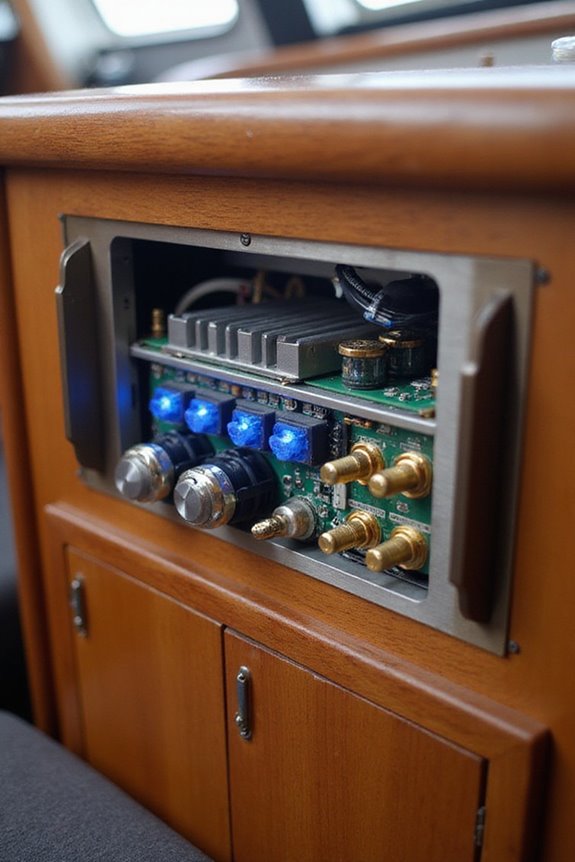
Since a yacht’s audio system has to face salty air, tight spaces, and tricky wiring, picking the right marine amplifier means looking beyond just wattage ratings. We want an amp that offers solid marine durability, like corrosion-resistant connectors and marinized circuit boards, so it won’t conk out the first time salt spray hits. Sound customization is key too — adjustable crossovers, bass boost capabilities, and even digital signal processing let us tailor audio perfectly to our yacht’s setup. Compact designs make installation easier in those cramped nooks, while multi-channel outputs add flexibility for different speaker arrangements. Basically, it’s about combining tough build quality with smart tuning options that keep sound crisp and clear, no matter the ocean’s mood. After all, crisp tunes make yacht life way more enjoyable, don’t you think?
Managing Power Consumption and Electrical Load on Your Yacht
Though it might seem simpler to just plug in and play, managing power consumption and electrical load on your yacht is actually a bit like juggling flaming torches—except the stakes are higher if something goes wrong. We need to balance electrical load carefully across power sources like batteries, generators, and shore power to avoid overloads that could shut down critical systems. Ever wonder how we keep navigation and communication running smoothly while enjoying onboard entertainment? Prioritizing essential systems is key. Tools like automatic start/stop for generators and power management systems help optimize energy use, reducing waste. Plus, monitoring power consumption in real time lets us spot issues fast. When we manage electrical load wisely, our yacht’s performance improves, and we can relax knowing everything runs safely and efficiently.
Selecting the Right Amplifier Class for Marine Environments
Managing power wisely on a yacht isn’t just about keeping the lights on and the fridge cold—it also means picking the right gear to match our unique energy needs. When selecting amplifier types for marine durability, we need to balance efficiency, sound quality, and how tough the gear is against salty air and constant vibration. Class D amplifiers win points for high efficiency and compact size, perfect for saving energy and space. But if we crave better sound fidelity, Class AB offers a solid middle ground—good quality without frying our power system. Classes A and B? Great for audiophiles but less practical due to heat and power demands. Ultimately, choosing the right amplifier class guarantees our music sounds great without stressing the yacht’s electrical system. Who said smooth sailing can’t include smooth beats?
Frequently Asked Questions
How Does Amplifier Cooling Affect Its Performance on a Yacht?
We’ve seen yachts lose audio clarity without proper thermal management. Effective heat dissipation keeps amplifiers cool, ensuring consistent performance and longevity. Together, we can choose cooling solutions that handle marine challenges and keep sound quality strong.
Can Marine Amplifiers Withstand Saltwater Corrosion Without Special Treatment?
We’re confident marine amplifiers offer exceptional saltwater resistance and built-in corrosion protection, so they don’t need special treatments. Together, we can enjoy reliable sound without worrying about harsh marine conditions compromising our gear’s durability.
What Role Does Bluetooth Connectivity Play in Yacht Audio Amplifiers?
We love how Bluetooth connectivity lets us enjoy seamless audio streaming with an impressive Bluetooth range, so we stay connected on deck or below. It’s perfect for sharing tunes, creating that true onboard community vibe.
How Important Is Input Sensitivity Adjustment in Marine Amplifiers?
Adjusting input sensitivity is like finding the Holy Grail for perfect sound on your yacht. We won’t settle for anything less because it guarantees audio clarity and protects your system, keeping us all sounding smooth and connected.
Are Variable Crossovers Necessary for Multi-Speaker Yacht Setups?
We think variable crossover types really boost speaker compatibility in multi-speaker yacht setups. They let us tailor audio perfectly, so everyone feels connected through crisp, balanced sound no matter where they are on board.

